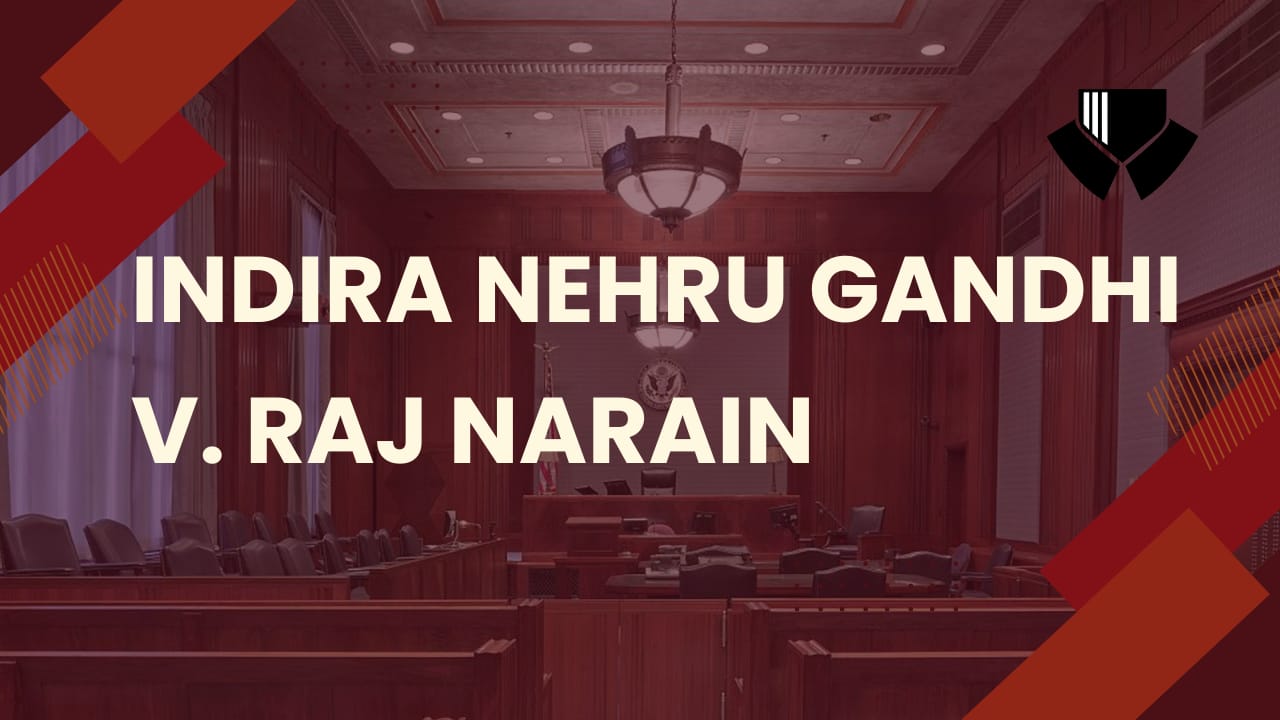This case analysis is written by Sohini Chakraborty, a 3rd year law student of Amity University, Kolkata.
CITATION: AIR 1975 SC 2299
COURT JUDGES: Justice Jagmohanlal Sinha & Y.V. Chandrachud & A.N. Ray (C J) & M.H. Beg & H.R. Khanna & K.K. Mathew
PETITIONER: Indira Nehru Gandhi
RESPONDENT: Shri Raj Narain & Anr.
BACKGROUND OF THE CASE:
The 1975 Indira Gandhi v. Raj Narain case was a significant legal and political development in the history of India. At the core of this case was the constitutional validity of then-Prime Minister Indira Gandhi’s political race to the Lok Sabha (the lower place of India’s Parliament) in the 1971 general decisions. The foundation of this case is established in the political disturbance of the mid-1970s.
Indira Gandhi’s authority had confronted mounting criticism and resistance. She led the Indian National Congress to a significant victory in the general elections in 1971, but her time in office was marked by allegations of electoral misconduct and growing discontent. Raj Narain, her political rival who had opposed her in the Rae Bareli constituency, submitted a petition challenging her election on a variety of grounds, including allegations of electoral malpractice.
The Allahabad High Court heard the case, and on June 12, 1975, Justice Jagmohanlal Sinha issued a landmark ruling in Raj Narain’s favor. Justice Sinha viewed Indira Gandhi to be liable for electoral corruption and abuse of government resources u/s-123(7) of the Representative of Peoples Act, 1951 during her campaign. The judgment refuted her political decision as well as precluded her from serving in a position of authority for six years. This decision shocked the political establishment and marked the first time a sitting Prime Minister had been removed from office through legal action.
However, the consequences of the verdict were just as significant. Confronting political and public strain, Indira Gandhi proclaimed a state of emergency on June 25, 1975, suspending civil liberties and stifling political disputes. This time of crisis rule remains a combative part in India’s vote-based history.
ISSUES:
- Whether the 39th Amendment to the Constitution met the requirements of the Constitution.
- The allegation that then-Prime Minister Indira Gandhi engaged in electoral malpractice during the 1971 general elections was one of the primary issues.
- The case raised fundamental concerns regarding Indira Gandhi’s election to the Lok Sabha, India’s lower house of Parliament, and the constitutionality of that election.
- The constitutional validity of the 39th Constitutional Amendment Act of 1975 including clauses 4 and 5 of Article 329A, was also questioned.
CONTENTIONS OF PETITIONER:
- Without judicial review, whether free and fair elections will take place is not a question that can be answered by the majority ruling in the Kesavanand Bharti case.
- Even the many sections of our Constitution show that judicial review might be omitted as a matter of policy in the right situations.
- Kesavanand Bharti and Shankari Prasad both spoke about the definition of “amendment” rather than the breadth of electoral disputes. Constituent power must therefore be used in plenary form.
- Article 14 is founded on a sound public policy that is accepted by all governments. The absence of judicial review does not, by itself, invalidate equality. Known as Article 31-B, it looks to deny equality but really advances the economy and promotes justice in the country.
- Anyplace the Constitution didn’t explicitly specify or take into account legal audit is open for rejection.
- Law and order isn’t a part of the basic plan, and beyond Article 14, neither the idea of uniformity nor law and order is perceived by our constitution.
CONTENTIONS OF RESPONDENTS:
- The Constitution’s institutional framework or basic structure is affected by the 39th Amendment Act.
- Our Constitution’s Article 14 also guarantees equality before the law and equal protection under the law. The President has unjustly elevated himself and other persons above the law by passing this bill.
- Parliament cannot modify the Constitution to determine who wins and loses elections under Art. 368.
- The Courts’ ability to exercise jurisdiction is also eliminated by the Amendments. Separation of powers was followed in our nation between the three branches of government. Therefore, negating or taking away the judiciary’s ability to make decisions in any way would be unfair.
- The cornerstones of any democracy are free and fair elections. The Judiciary must step in to ensure justice is served if elections are fraudulently won.
JUDGEMENT:
The court decided that the first portion of the 25th Constitutional (Amendment) Act of 1972 was intra vires and the second part of the act was supra vires, but upheld the entirety of the 24th Constitutional (Amendment) Act of 1971. By upholding the contested 39th amendment, the five-judge bench demonstrated to the legislature that they were only chosen to create laws that benefited the “people of India” and not laws that benefited them personally. By applying social engineering and weighing the interests of both parties, the court determined that neither the Parliament nor the states could remove the constitutional provision requiring the establishment of a welfare state and an equal society.
The court ruled 7:6 in favor of Parliament’s ability to change any and all constitutional provisions, provided that doing so does not go against the document’s fundamental principles.
The court determined that the respondent has the right to amend under the contested Article 368 after a lengthy analysis and heated debate. The court clarified what was pre-Golaknath implied after this ruling. The court concluded that there is a distinction between an ordinary statute and an amendment in actuality after hearing arguments from both sides.
CONCLUSION:
The verdict in the Indira Gandhi v. Raj Narain case, in sum, is evidence of the impartiality and integrity of the Indian judicial system. No one, regardless of their position, is above accountability in a democratic society, as evidenced by the upholding of the ideals of free and fair elections and the rule of law. This significant decision had far-reaching effects on both the political and legal fronts, influencing India’s democratic discourse for many years to come.


